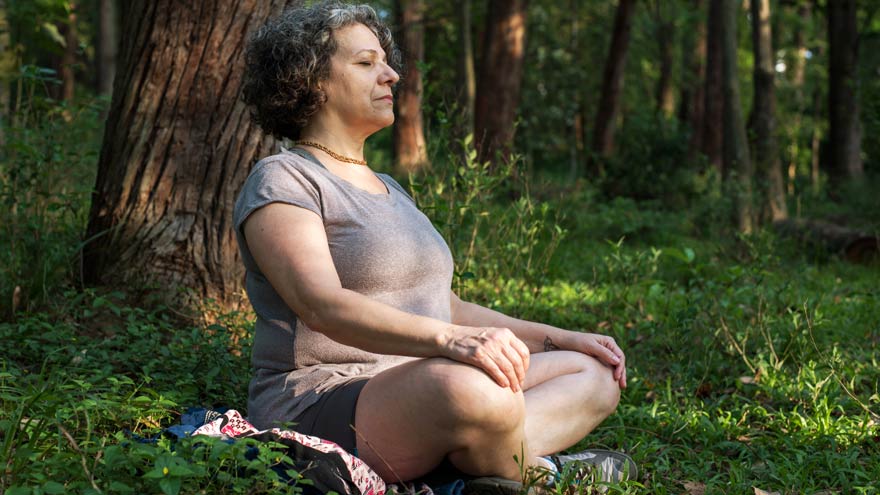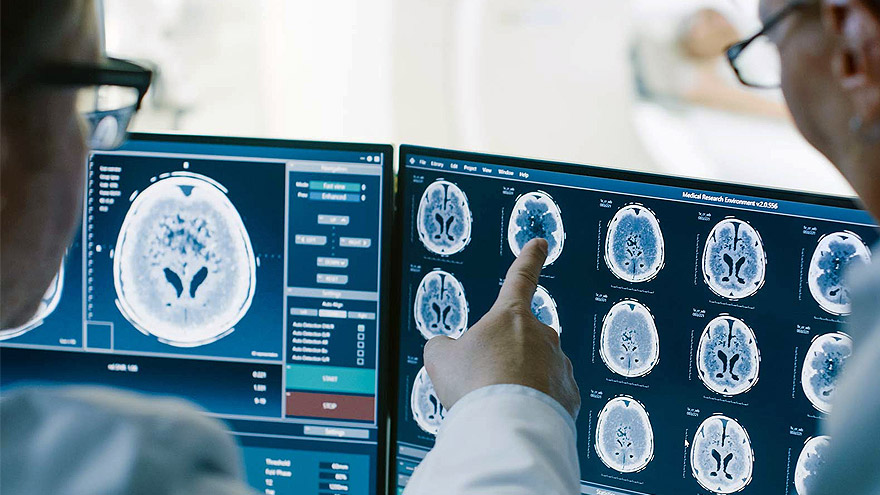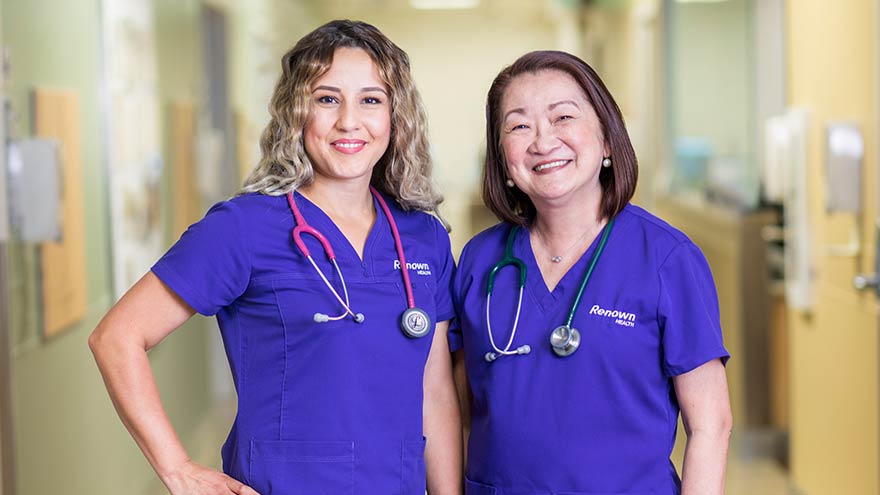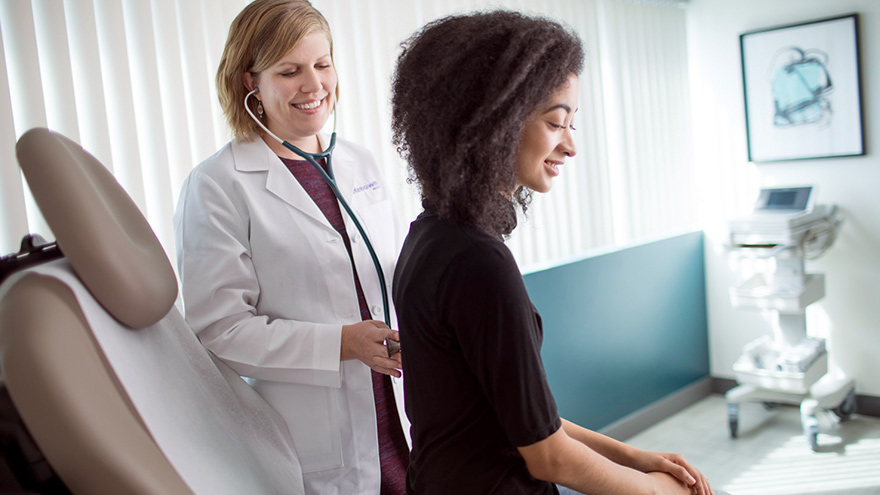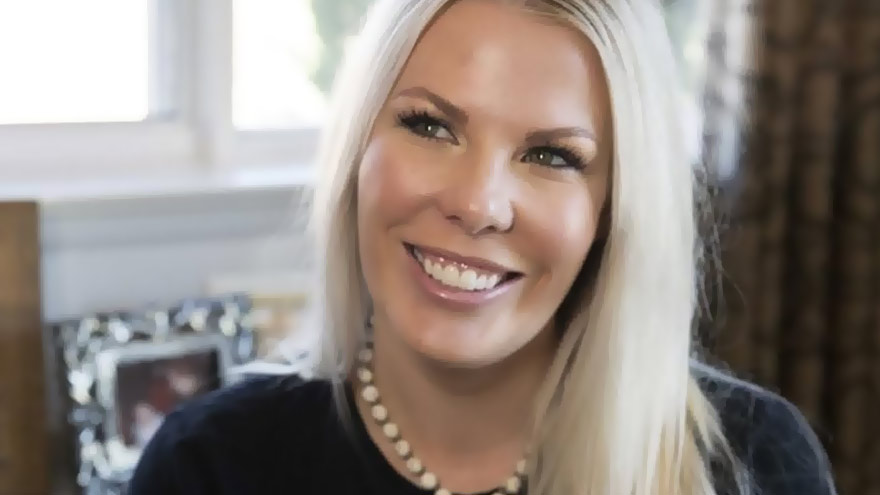Search
-
A True Joint Effort: Exercises to Prevent Knee Pain
Experiencing knee pain during exercise or while undertaking daily activities? The knee is the largest joint in our body, so it goes without saying a lot hinges on its functionality. Here are a few exercises to help. Is exercise a real pain in the knee for you? Does getting up in the morning require a few minutes for your knees to adjust to walking around? As it turns out, knee pain is common, and it can result from injury, overuse or the breakdown of cartilage over time. Often, this pain is a result of faulty mechanics in your body, according to Jessica Ryder, a physical therapist with Renown Physical Therapy and Rehab. “We see weakness at the hips causing a lot of stresses at the knee,” she says. Exercises that Alleviate Knee Pain Try these three exercise to strengthen your glute muscles and maintain proper alignment in your knees. Hip Lift Lie flat on your back with your knees bent and feet flat against the floor. Lift your hips into the air until your body is in a neutral position, then lower your hips back down. Repeat this motion several times until you feel a gentle burn in your glute muscles. Step Down Stand with one foot on a stair or step. Slowly bend your knee and drop the other foot toward the floor. Slowly extend back up to your starting position. While doing this exercise, it’s important to move slowly, maintain control and ensure that your knee is in line with your toes. Do as many reps as needed until you feel a small fatigue in your muscles. Repeat this exercise on the opposite leg. Side Step with Exercise Band Place an exercise band around your ankles. Stand in a slight squat and then take several steps to the side until you feel a small fatigue on the outside of your hips. While doing this exercise, keep your upper body still and focus the exercise to your hips. The band will try to move your knees toward each other Repeat in both directions. Hometown Health and Renown Health are proud to be the official insurance plan and healthcare partners of the Nevada Wolf Pack. Renown Physical Therapy and Rehab | 775-982-5001 Through outpatient physical, occupational and also speech therapy, Renown Physical Therapy and Rehab gives patients hands-on, individualized treatment. Our therapists use evidence-based methods to help patients return to an active, productive lifestyle. Learn More About PT
Read More About A True Joint Effort: Exercises to Prevent Knee Pain
-
Do You Resolve to Lose Weight and Live Healthier? Here's How.
Weight loss and healthier living tend to top most people’s lists of New Year’s Resolutions. So if you’re like the vast majority, here’s help — a comprehensive look at all of Renown Health’s programs that will help you lose weight and tackle metabolic challenges. Quick quiz: How many of the following apply to you? You have a need to lose weight, but you haven’t been guided on how to make sustainable change; You’re experienced a recent rapid weight gain, but lab tests didn’t reflect a change in your health; You’ve experienced a life-changing event that caused weight gain; You have problems with where you are carrying your weight, such as your mid-section; You’ve tried other weight loss programs, but they didn’t work. If you found yourself nodding in agreement to any one of the above statements, Renown’s programs can help. They cover the spectrum of helping with weight or metabolism challenges. But the million dollar question is: Where do you start? How to Lose Weight and Live Healthier Ideally, it’s best to start by talking with your primary care provider. Your provider knows your medical history and concerns related to your health. Talk to your provider about your past history with weight loss and gain. Your primary care provider will assist with the referral process and provide you with options you might not considered on your own. Most importantly, by starting with your primary care provider, you can take full advantage of all your health benefits. Renown offers four weight loss/management programs: Medical Nutrition Therapy Meet one-on-one with a Registered Dietitian at Renown’s Health Improvement Program to discuss your health goals. You may qualify for this program if you have: Heart or kidney disease Gastrointestinal issues Weight gain or weight loss Food allergies or sensitivities High blood pressure or high cholesterol A thyroid condition Diabetes – classes available, including: Type 2 Diabetes, insulin and gestational diabetes management during pregnancy (Offered in English & also in Spanish). For more information, call 775-982-5073. Medical Weight Management This program includes a one-on-one appointment with a board-certified bariatric doctor. You will receive a comprehensive evaluation and customized treatment plan to meet your needs and medically manage your overweight or metabolic challenges. Treatment options in this program may include nutrition changes, meal replacements, medication, exercises and also behavioral therapy. Here are a few qualifications for the program: A BMI of 25 or higher and health risk such as Type 2 diabetes, obstructive sleep apnea, cardiovascular disease, stroke, gout, osteoarthritis, infertility or polycystic ovarian syndrome A BMI of 30 and higher A metabolic problem such as diabetes, fatty liver and is not responding to regular medical care. Those with a metabolic problem may be considered normal weight, however may need to lose fat mass or reduce their waist size to get healthier. An increased risk of heart disease, stroke or Type 2 diabetes, regardless of weight that is not responding to regular medical care. For more information, call 775-982-5073. Bariatric Weight Loss Surgery We understand that the desire to have bariatric surgery is a choice you are making for your long-term health. Our team provides education on the necessary steps before, during and after surgery to ensure you are successful in controlling your obesity. You may qualify for this program if you have: A BMI of 40 or more, or: A BMI of 35 to 39.9 with significant health problems such as hypertension, high cholesterol, sleep apnea, diabetes or diagnosed arthritis To learn more, visit our Bariatric Surgery. You may also attend one of our monthly Weight Loss Surgery Seminars to learn if you are a candidate. Dietary Consultation at Renown Medical Group Many people aren’t aware that you can schedule short, frequent visits with a registered dietitian at Renown Medical Group locations in Reno or Sparks. Telehealth is also available at the Renown Medical Group – Fernley. Qualifications include: A BMI of 30 or greater You have a primary care provider with Renown Medical Group Medicare or Senior Care Plus member Since this program is only offered through Renown Medical Group, you must be an established patient. To establish with a primary care provider, call 775-982-5000. Talk to your primary care provider to see if you qualify for one of Renown’s weight management programs. Going through the referral process is the best way to ensure you are taking full advantage of your health benefits.
Read More About Do You Resolve to Lose Weight and Live Healthier? Here's How.
-
Prostate Cancer: Symptoms, Treatments and Screenings
Did you know: More than 2.9 million men in the United States who have been diagnosed with prostate cancer at some point are still alive today. Prostate cancer is common, but also treatable, especially when caught early. Dr. Michael Hardacre of the Renown Institute for Cancer explains. With the exception of skin cancer, prostate cancer is the most commonly diagnosed form of cancer in American men. In fact, the American Cancer Society offers these key statistics: About 1 man in 9 will be diagnosed with prostate cancer during his lifetime. Prostate cancer develops mainly in older men and in African-American men. About 6 cases in 10 are diagnosed in men aged 65 or older, and it is rare before age 40. The average age at the time of diagnosis is about 66. The good news: This form of cancer is very treatable when also detected early. Michael Hardacre, MD, radiation oncologist with Renown Institute for Cancer, is here to explain more about prostate cancer screenings and their role in early detection. What is the prostate? The prostate is a gland that only males have, and it makes part of the seminal fluid. Prostate cancer begins when the cells in the prostate gland start growing uncontrollably due to a change in the cell’s genes. Researchers are working to find what leads to the disease. Certain types of prostate cancer are hereditary, or passed on through genes. However, most types of prostate cancer are acquired and developed later in life. What are some of the signs of prostate cancer? Common signs of prostate cancer include: Frequent urination Weak urine flow Painful urination or inability to urinate Blood in urine or semen Painful ejaculation Erectile dysfunction If you notice any of these signs, talk with your primary care doctor. Although it may be intimidating to talk about any of these signs or symptoms, the earlier prostate cancer is detected, the better the options for treatment. How can you screen for or detect prostate cancer? The good news is that prostate cancer can often be found before symptoms appear, because screening is as simple as a blood test. Your doctor will look for levels of a prostate-specific antigen in the blood. If the results come back with anything concerning, then additional testing would be recommended. A transrectal ultrasound can also be used, which is usually painless and only takes about 10 minutes to complete. This exam gives the doctor an image of the prostate to measure its size, which can help determine the density of the prostate-specific antigen. If this test comes back with any suspicious results, then your doctor may recommend a biopsy. What are the treatment options? Depending on each case, treatment options for men with prostate cancer might include: Watchful waiting or active surveillance Surgery Radiation therapy Cryotherapy (cryosurgery) Hormone therapy Chemotherapy Vaccine treatment Bone-directed treatment It’s important to discuss all of the treatment option with your doctors, including goals and possible side effects, to help make the decision that best fits your needs. Some important things to consider when choosing a treatment option also include: The stage and grade of your cancer Your age and also your expected life span Any other serious health conditions you have Your feelings (and your doctor’s opinion) about the need to treat the cancer right away The likelihood that treatment will cure your cancer (or help in some other way) Your feelings about the possible side effects from each treatment Renown Institute for Cancer | 775-982-4000 At the Renown Health Institute for Cancer, our experienced team provides the support and care to maintain the highest quality of life and then achieve the best possible outcome, all in one location that’s close to home. Our dedicated team, clinical expertise and also advanced treatment options allow us to tailor care to each patient. Learn about: Our Team Cancers We Treat Screening and Prevention Treatment Options
Read More About Prostate Cancer: Symptoms, Treatments and Screenings
-
Lighten Up With Healthy Shrimp Avocado Spring Rolls
The longer days of spring bring us more daylight and more hours to enjoy the sun. At dinnertime, we’re craving something lighter than the heavy stews and dishes of winter. Lighten up your palate for spring and usher in the new season — without sacrificing taste — with these do-it-yourself spring rolls. And with no cooking required, kids can roll up their sleeves and easily join the fun.
Read More About Lighten Up With Healthy Shrimp Avocado Spring Rolls
-
7 Quick Ways to Keep Your Humidifier Bacteria-Free
Humidifiers are a great way to moisturize the air in your home as outside temperatures plummet, helping with chapped skin, allergies and cold and flu symptoms in children and adults. But without regular upkeep, humidifiers can breed dangerous mold and bacteria and do more harm than good. We’ve gathered some tips for keeping your humidifier — and your home — clean and bacteria-free. Dirty humidifier tanks can quickly breed bacteria and mold. This can be a problem for healthy people, but especially problematic for people with asthma and allergies when the contaminated mist or steam is released into the air. Here are some top ways to keep your humidifier humming and prevent unintended bacterial growth. Use distilled or demineralized water. Tap water contains mineral-creating deposits inside your humidifier that promote bacterial growth. These minerals often appear as white dust on your furniture. You may also breathe in some of these minerals. Distilled or demineralized water has a much lower mineral content compared with tap water. Instead of distilled water, you can also use demineralization cartridges or filters in your humidifier if they’re recommended by the manufacturer. Change the water often. Avoid letting water sit in the tank for long periods of time. This causes mineral deposits to collect on the bottom and sides of the tank. The longer the water sits, the more deposits will collect and the harder they’ll be to remove. Keep the area around the humidifier dry. If the area around your humidifier becomes too damp, turn it down. Surrounding the humidifier with dampness can lead to mold and bacterial growth. Change the filter in your central air conditioning and heating system regularly. Your humidifier is circulating more water in the existing air in your home. Optimize the cleanliness of your humidifier by ensuring your general air quality is clean. Clean the humidifier regularly. When the humidifier is in heavy use during the winter or when a family member has a cold, clean it weekly with a simple vinegar or hydrogen peroxide rinse. Do a deep monthly clean of the tank, base and filter (or per your manufacturer’s instructions). Replace the humidifier when necessary. Old humidifiers may start to break down over time. The worn-out parts will be more prone to hosting bacterial growth. If you’ve had your humidifier for five years, you might want to consider replacing it. Humidifiers can build up difficult mineral deposits, which are impossible to remove and encourage bacterial growth. Store the humidifier properly. Before putting your humidifier in storage, clean it thoroughly. Throw away any temporary parts (such as used filters or water cartridges) and make sure it is completely dry. Rinse or clean it again before using it the next time. Order any new filters or cartridges you’ll need when you use it again and store them with the humidifier. With proper maintenance, a humidifier can be an affordable at-home method for fighting colds and flu, and for making indoor winter air more hospitable. If you have a humidifier built into your central heating and cooling system, consult the instruction manual or ask your heating and cooling specialist about proper upkeep. Learn more healthy living tips and sign up for wellness classes through Renown’s Health Improvement Programs.
Read More About 7 Quick Ways to Keep Your Humidifier Bacteria-Free
-
Delicioso! Heart-healthy Bean Tostadas
Craving Mexican food, but staying away from sodium and trans-fats? These heart-healthy bean tostadas will satisfy without ingredients that are bad for your heart. These tostadas are rich in protein, vegetables and best of all — flavor. We asked Renown Chef Chris Wyatt to lighten up one of our favorite dishes, and he delivered! Check out his recipe for black bean tostadas that are rich in protein, vegetables, and best of all, flavor.
-
May is National Stroke Month: Know the Signs and B.E.F.A.S.T.
Every 40 seconds someone in the U.S. has a stroke, but 80 percent of all strokes are preventable. That’s why knowing the signs and symptoms and what to do is so important. With May being National Stroke Month, we asked Sadie Wangler, program manager with Renown Institute for Neurosciences, to explain more. We can prevent strokes by changing our lifestyle behaviors that increase our risk. Knowing the symptoms and being prepared to B.E. F.A.S.T. are key as well. We asked Sadie Wangler, program manager for the Renown Institute for Neurosciences, what everyone person should know about stroke. What is a stroke? A stroke can be caused by a blood clot within an artery in the brain or a blood vessel. The clot can burst due to blockage and this causes blood flow to the brain to be cut off. Without the proper bloodflow and oxygen getting to the brain, the brain’s tissue begins to die. How to spot symptoms of a stroke? The easiest thing is to remember the word “B.E.F.A.S.T.” B – Loss of balance: Ask the person to walk 5-10 feet, with light assistance, and ask if they felt dizzy or off balance. E – Double Vision or blurred vision: Ask the person if their vision has changed in any way. F – Look for face drooping: Ask the person to smile and see if one side of their face droops. A – Arm weakness: Ask the person to raise both arms. Does one arm drift downward? S – Speech difficulty: Ask the person to repeat something. Is their speech slurred or strange? T – Time to call 911: Time matters – so don’t wait to call an ambulance if you or a loved one is experiencing these symptoms. You can also watch for sudden numbness or weakness in the face, arm or leg, especially on just one side of the body. Look for any confusion — if they’re having trouble speaking or difficulty understanding others talk — and if they have trouble seeing in one or both eyes, trouble walking, dizziness, loss of balance, or sudden and unexplained severe headache. The signs of stroke happen suddenly and a lot of people may deny their symptoms, thinking they’re overreacting. But it’s critical to act quickly and get medical attention right away — when it comes to stroke and saving your brain, minutes matter. What should you do if you think you or someone you love is having a stroke? In addition to seeking help right away, it’s best to call 911 and get an ambulance. A lot of people make the mistake of driving themselves to the hospital or have someone else drive them, and this can be dangerous for a number of reasons. First of all, it can put you, your loved ones and others on the road in danger. Second, going to the hospital on your own can take more time than calling an ambulance, and when it comes to stroke, every minute of medical care counts. So it’s important to call 911 and get treatment immediately. What can you do to prevent stroke? A stroke can happen to anyone, but certain risk factors can increase your risk. There are some risk factors you can’t control: your age, family history, race and gender. Stroke risk is higher for women and people over the age of 55. Fortunately, there are some risk factors you can control, such as high blood pressure, smoking, artery or heart disease, high cholesterol, as well as obesity, poor diet and lack of exercise. A lifestyle focused on healthy diet and regular exercise can greatly reduce your risk for stroke. Quitting smoking and watching your alcohol intake can help too. The Renown Regional Medical Center has been certified as a Comprehensive Stroke Center by the Joint Commission and received the Gold Plus Achievement award by the American Stroke Association. Our Stroke Program provides evidence-based primary stroke care including evaluation, treatment and education to patients who arrive at a Renown facility with the signs and symptoms of stroke. Learn more online. Renown Institute for Neurosciences: 775-982-2970 The Renown Regional Medical Center Comprehensive Stroke Program provides evidence-based comprehensive stroke care including evaluation, treatment and education to patients who arrive at a Renown facility with the signs and symptoms of stroke. Learn more about treatment options for stroke and additional ways to reduce risk factors online. Learn More
Read More About May is National Stroke Month: Know the Signs and B.E.F.A.S.T.
-
One Patients Story of Survival
Thanks in part to the care provided by Renown’s award-winning team of ICU nurses, Tony Mowatt is alive, thriving and engaged. Read his story — and learn about the exclusive Beacon Award of Excellence — below. The open road. The growl of the engine. The feeling of freedom. That’s what Oakland resident Tony Mowatt was enjoying as he drove up Highway 88 toward Reno for the semi-annual Street Vibrations event. But he wasn’t expecting to hit the diesel truck — or to fly off of his bike over 100 yards, skidding onto the side of the road. He was severely injured and in the midst of rural Nevada. He had crashed just outside Centerville, Nev., and was miles away from any critical care hospital. Having the only trauma center equipped to treat his serious injuries, Tony was flown to Renown Regional Medical Center and admitted to the intensive care unit (ICU). ICU Nurses Treat Patient, Support Family Tony’s girlfriend, Tasha Klubock, was notified by his friend that he had been taken to the hospital. She immediately drove from Oakland to Reno to see Tony at Renown. Her first night there was overwhelming and scary — nobody knew if Tony was going to survive. But the nurses helped Tasha cope with the initial shock. Caring for the patient isn’t their only job — they also care for the family. “They [the nurses] just kept coming in and checking on me,” she said. “Angela was so amazing that first night. I really just bonded to her, and I remember when the shift switched, I panicked thinking about who was coming on and wanting to meet the next nurse … But they all came to talk to me — I had updates from everybody. It was just amazing.” ICU Nurses Became Family Tony spent 32 days in Renown’s Sierra ICU, surviving a serious head injury, all with Tasha by his side. He and Tasha still stay in touch with Renown nurses. “Even though this was literally one of the most hideous, craziest things to go through,” Tasha said. “There was so much hope and they became such a family to me and I still think of that time fondly because of the nurses.” “I’m alive because they wanted me to be,” Tony said. And Tony and Tasha are now happily engaged and planning their wedding. Exceptional Care: Renown ICU Nurses Win Awards Renown’s ICU nurses provide care like this every day to countless patients — it’s so second nature to them that they forget how exceptional it truly is. But it’s certainly care like Tony’s that has earned them national recognition. The American Association of Critical Care Nurses awarded the Beacon Award of Excellence to the Sierra, Cardiac and Roseview ICUs. These are the only ICUs in Nevada to obtain this honor. The Beacon Award recognizes critical care nursing teams who exemplify excellence in areas like leadership, process systems, quality care, knowledge, learning and development, excellence in patient care and superior patient health outcomes. “I couldn’t have been more proud of what we’ve done to accomplish this,” said Nick Dovedot, Cardiac ICU nurse. “It represents who we are. Just a great group of individuals who all work together as a team to make our patients get better.”
-
The Healthy Nevada Project Changed My Life: A Local Mom's Story
Read about Jordan Stiteler, a local mom who says the Healthy Nevada Project provided insights into her family’s genetic makeup — and the likely cause of her dad and great grandfather’s deaths. Now she is changing her life due to her new diagnosis of familial hypercholesterolemia, which will allow her to take steps toward preventing the same fate. Jordan Stiteler’s dad died suddenly of a stroke nearly ten years ago — at only 45 years old. His grandfather died at age 40. Now through the Healthy Nevada Project’s no-cost genetic testing, she is closer to understanding why that may have happened. And she can take proactive steps to prevent the unhealthy symptoms that often lead to a stroke and heart problems. After getting her Geno 2.0 by National Geographic ancestry report, Stiteler got a call from Renown Institute for Heart & Vascular Health Cardiologist and Renown IHI Director of Research, Dr. Christopher Rowan. “They told me that I have FH, which is familial hypercholesterolemia,” she said. “I have genetically very high cholesterol because I have a non-functioning gene that doesn’t get rid of my cholesterol like a normal body would.” Familial Hypercholesterolemia: Simple Life Changes Dr. Rowan told Stiteler it is curable with medication and a change in lifestyle. Stiteler has embraced healthy lifestyle changes by exercising more and eating healthier. “It is so important. Being a mom, I think you have so much more to live for. Having this information has changed my life.” Stiteler feels confident FH affected her Dad. “It is helping my family realize that we need to get tested,” she said. “There were big milestones that my Dad missed. He didn’t get to see either of us get married or have our children. That was huge.” She has become passionate about sharing the need to join the Healthy Nevada Project as her way of helping to prevent other families from possibly going through what she and her family did with the early loss of her Dad. In addition to FH results, the Healthy Nevada Project is returning clinical results on BRCA 1/2 (hereditary breast and ovarian cancer) and Lynch syndrome (colorectal and endometrial cancer) to consenting study participants. To sign up for the Healthy Nevada Project, go to HealthyNV.org. Join the Healthy Nevada Project Recruitment for phase two is still open. In addition to opting in to receive clinical results, participants receive National Geographic’s Geno 2.0 ancestry app at no cost. They also have the chance to pick an additional app for health and wellness after completing a follow-up survey. Learn More or Sign Up
Read More About The Healthy Nevada Project Changed My Life: A Local Mom's Story
-
Book Ahead to Make Urgent Care More Convenient
How do you take the waiting game out of your Urgent Care visit? Book ahead! Here’s how this convenient service can help you schedule your appointment and see updated wait times at area urgent care facilities. We’ve all been there, done that: It’s after hours, you need to see a doc, and urgent care is slammed. Renown now offers a convenient option that will enhance your experience. Here’s How Book Ahead Works: From your phone or computer, you can check urgent care wait times around our region. This lets you see if the urgent care by your office is busier than the one closest to home — which may help your planning. Through Book Ahead, you can join the line at a specific urgent care just as you would in person. This allows you to stay home or at work as long as possible so you are more comfortable. Book Ahead When and Where to Receive Care We have many choices when it comes to our medical care. Should you visit a doctor’s office, urgent care, emergency care or make a Virtual Visit? It’s important to know which choice is right for your situation or condition. We asked Luis Palacio, M.D., with Renown Urgent Care to explain the differences and how to make your visit as smooth as possible. If you have been experiencing flu-like symptoms for less than 48 hours, call your doctor’s office. They can then determine if you can be treated with a prescription antiviral medicine. Visit urgent care or the emergency room only if you are unable to eat or drink anything and may be dehydrated, have a fever over 102.5 degrees F, or are experiencing shortness of breath. You can use Renown’s Virtual Visits videoconference service for flu-like symptoms so that you don’t need to leave the comfort of your home and you reduce the risk of spreading the virus to others. Virtual Visits allow you to see an urgent care provider from your home or office using a cellphone, computer or tablet with video capabilities. It is open from 8 a.m. to 6 p.m. Monday through Friday, and 9 a.m. to 4 p.m. Saturday and Sunday. How Do You Book Virtual Visits? Go to Virtual Visits to get started. Here, you’ll learn what virtual check-in is all about: It allows you to stay where you are and receive text notifications once a care provider is almost ready to see you. Click, join a line, and we will ask you some questions about your symptoms. This allows us to make sure you don’t need to call 911 or go to the ER. Reasons to visit the ER include stroke, chest pain, severe shortness of breath, uncontrolled bleeding, seizures and severe allergic reaction. If you answer “no,” you will see the wait times for each urgent care location. If you need to get in right away, you can select the location with the shortest wait time. Or, if time is not an issue and you’d prefer to stay closer to your home or office, you can select that location. Once you’ve selected a location, you input your cell number, name and number of patients. As your appointment gets closer, urgent care will text you with updates on timing. When you get the text message, you can choose to get “more time” and have your appointment pushed back, or tell them you’re ready to be seen and on your way. Learn more about how to Book Ahead at Renown urgent care below.
Read More About Book Ahead to Make Urgent Care More Convenient
-
Woman With Family History of Cancer Taking Action Today
With a family history of breast and other cancer, Aime′ Landaburu isn’t missing a single health screening. She recently had her first mammogram as well as a whole breast ultrasound, which detects 41 percent more cancers and reduces the number of false-positive results. Like many people, Aime′ Landaburu is busy juggling parenthood and a career. It would be easy to put health screenings on the back burner, but with a grandmother who has survived breast cancer three times and a grandmother who had ovarian cancer, Landaburu is addressing her family health history head-on. “I decided at 35 that I needed to get my screenings done because I have my family history of both grandmothers having had cancer,” Landaburu says. “In addition to the mammogram, I was really interested in doing the whole breast ultrasound. It is the same price as getting my hair done and it’s potentially something that could save my life.” Landaburu says the procedures were painless. “It was really comfortable, and the techs were all so nice and kind and gentle and explained things along the way.” Breast Screening Technology Provides Greater Insight George Krakora, MD, lead radiologist for Renown’s Breast Health Center, says the new 3D imaging for mammograms is picking up subtle cancers that would not have been seen with the previous 2D imaging. “It’s an additional tool that helps find those subtle cancers that may be missed in dense breasts,” Dr. Krakora says. With the whole breast ultrasound, the tech screens for masses — which are often obscured on the mammogram X-ray. Studies show it detects an additional 2 to 3 cancers per 1,000 women that would not have been detected with routine mammography. “Aime′ was noted to have heterogeneous dense breast tissue. That puts her at a little higher risk for cancer and also limits the sensitivity of mammography,” Dr. Krakora says. Multiple Ways to Screen for Breast Cancer However, Dr. Krakora notes, breast ultrasound is not a substitute for mammography, which can detect calcifications that can represent the earliest forms of cancer.” Surprisingly to Landaburu, her results came in just three days. “It’s so important to know what’s going on in your body. I was really nervous when I first got the paperwork, but ultimately it was negative, “ Landaburu says. “I’m thankful it was good and I have a baseline for the future.” Landaburu also advises other young women with a history of breast cancer to proactively communicate. She says it’s important to reach out to women they know who have survived breast cancer. “You have to take the first step and you want to be around for your kids and your family and yourself,” she says. “So utilize your resources, educate yourself and go get screened.” Breast Cancer Screening and Prevention Breast cancer begins when abnormal cells in the breast grow out of control. These cells form tumors that can grow into the surrounding tissue and spread to other parts of the body. Breast cancer occurs mostly in women, but men can also develop breast cancer. To schedule a mammogram or whole breast ultrasound, call 775-982-8100, or schedule an appointment online. Make an Appointment
Read More About Woman With Family History of Cancer Taking Action Today
-
Cancer Support FAQs: How to Help When It's Someone You Love
Every cancer journey is different — and so are the ways individuals deal with a cancer diagnosis. So if you’re a close friend or family member, how can you help? Bobbi Gillis, manager of cancer support services with Renown Institute for Cancer, explains more. Just as we are all unique, we all also have our own ways of dealing with difficult news. For some, receiving a cancer diagnosis is devastating, and they want family members rallying around them in support; for others, they want to be left completely alone. So how do you know what is helpful and what is hurtful? For advice, we reached out to Bobbi Gillis, manager of cancer support services with Renown Institute for Cancer. Support, Defined What are some ways to support a loved one when they find out they have cancer? First and foremost, let them know you are there for them. As we can all imagine, a cancer diagnosis is scary, and it’s helpful just to know you have support if and when you need it. Second, try to listen and give advice only when you are asked. In trying to help as much as possible, many family and friends take on the role of “researcher” to find out more treatment options, but it’s best to avoid saying “you should try this” or “you ought to do that.” Patients are already dealing with a lot of information at once from care providers and their own research. You don’t want to make them feel overwhelmed or question the treatment they’re planning. What are some words of encouragement or support people can use? Just as you would in any difficult situation, speak from the heart and be genuine. But also be careful not to show false optimism or to tell them to just stay positive; saying these things may discount their fears and concerns. Here are some ideas to get you started: “We’re going to get through this together.” “Count me in to help out.” “I’m not sure what to say, but I want you to know I care and I’m here.” What resources are available to patients? What about their families? For patients with cancer, we offer support groups in-person or online. There are also support groups specific to the type of cancer you or your loved one have. You can check these out on our website, renown.org, or ask your care provider. There are also support groups and emotional support services available for family and friends. How can family and friends help throughout cancer treatment? It’s great to offer help, but it’s important to be specific when you offer. Saying “call me if you need something” is very general, and people may feel like they’re putting you out when they do ask for something specific. Instead, offer help with certain tasks — like driving them to treatment, babysitting, making them dinner or buying groceries. As much as possible, keep things normal. For some patients, being able to do everyday things like walking the dog helps them feel better. Loved ones can try to do too much for a patient, and while well-intentioned, this can make them feel less useful after being diagnosed. Renown Institute for Cancer | 775-982-4000 At the Renown Health Institute for Cancer, our experienced team provides the support and care to maintain the highest quality of life and then achieve the best possible outcome, all in one location that’s close to home. Our dedicated team, clinical expertise and advanced treatment options allow us to tailor care to each patient. Learn about: Our Team Cancers We Treat Screening and Prevention Treatment Options Find a Doctor
Read More About Cancer Support FAQs: How to Help When It's Someone You Love

